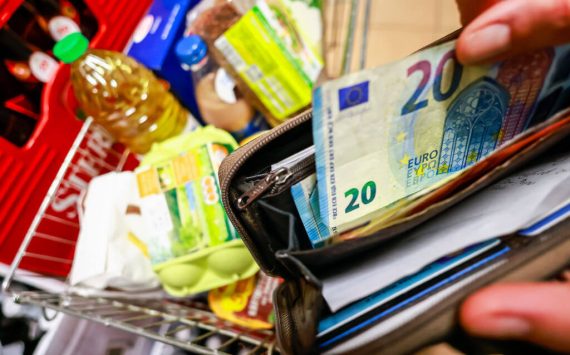The inflation rate in Germany has reached 7.3 percent, the highest level in forty years. Although an increase in inflation was expected, this number has surprised most economists. The Russia-Ukraine war has further increased the already rising energy prices and exacerbated the inflation. Consumer prices rose by 7.3 percent in March 2022 compared to March 2021. While the inflation rate was 4.9 percent in January and 5.1 percent in February of this year, the current inflation rate of 7.3 percent shows a significant increase.
The German Council of Economic Experts (Sachverständigenrat zur Begutachtung der gesamtwirtschaftlichen Entwicklung, Wirtschaftsweisen) expects a record inflation of 6.1 percent for 2022. This would be the highest rate since reunification. By comparison, last year’s inflation was 3.1 percent. Now the coalition government in Germany is discussing how to pursue its Russia policy that has a significant impact on the economy, especially in the energy sector.
Disagreement among economists
Not only Germany is struggling with economic difficulties, but the whole euro zone is affected by the Russia-Ukraine war. The European Central Bank might raise interest rates, but it wants to keep insisting on its loose monetary policy. Michael Heise, chief economist at HQ Trust, describes the situation, as follows: “For European monetary policy, the situation is getting more difficult from week to week. High inflation and further disruptions in production processes threaten to slow economic growth to zero.”
The so-called Wirtschaftsweisen (economic experts), who advise the German government on economic issues, have set their forecast for economic growth in Germany’s gross domestic product at 1.8 percent for 2022, significantly lowering expectations.
Other economists warn against a complete halt to imports of Russian energy, as inflation could otherwise rise to as much as 10 percent. Institute for Economic Research President Marcel Fratzscher claims that “some companies would probably have to stop production and put more people on short-time work.”
Other economists, in turn, claim that an import freeze from Russia is a distinct possibility. For the German economy, this would pose a major challenge, but it would not be impossible. Economist Veronika Grimm has pointed out that the German government should not only pay attention to economic developments, but also draw on moral and ethical values.
Grimm criticized Chancellor Olaf Scholz, who rejected the economist’s proposal to stop imports from Russia. Scholz criticizes the proposal by arguing that there is only a limited amount of gas available on the world market, and stopping the import of gas from Russia would be irresponsible.
In fact, there is a risk that other countries, especially developing countries, would be very much affected by the gas import stop. Indeed, gas imports are also related to the functioning of supply chains, logistics, and transportation. Germany would no longer be able to implement the latter at the highest level. Again, countries that import goods from Germany and are also dependent on it would be very strongly affected.
German population suffers
Since the pandemic, the German economy, like almost every other country, has suffered a severe setback, which at the time was also felt by the German population. The Russia-Ukraine war, however, has dealt an even harder blow to the German economy. The abovementioned energy prices and the associated price increase in other economic fields have put the German population in a difficult situation.
According to the YouGov survey conducted in March, 15.2 percent of the German population can no longer pay their living expenses. The respondents also stated that their situation was currently threatening their very existence. In January, this rate was 11 percent.
23.6 percent of people with a net income of at least 2,500 euros said they were no longer able to meet regular expenses because prices were rising disproportionately to wages. In January, this figure was only 17 percent.
The German coalition government had announced a relief package to offset rising prices. Among other things, the traffic light coalition has decided to reduce the energy tax for three months to make gasoline and diesel cheaper. In addition, employees will receive a one-time energy allowance of 300 euros on their gross salary and families will receive a 100-euro bonus per child on their child allowance. The relief package adopted for the month of February has cost the German government 16 billion euros.
Recommended
According to the YouGov survey, 53.4 percent of respondents said they are very worried about rising prices of goods and services. Three months ago, the figure was 44 percent. Therefore, 61.3 percent would like to receive further support from the state. In their view, the federal government’s relief package is not enough to mitigate the effects of inflation.
Uncertain future
The Russia-Ukraine war has been very damaging to the German economy. Currently, the voices are not yet so loud due to the current economic situation. Still the Russia-Ukraine war dominates the political discourse. However, Federal Finance Minister Christian Lindner is already warning that Germany is facing hard times.
“The Ukraine war is making us all poorer. I have serious concerns about economic development. Growth is declining, prices are hiking. In the long term, we will have to lay new foundations for prosperity. Germany must renew its growth model of a social and ecological market economy,” he said.
Lindner’s statement and the YouGov survey show that Germany is sailing towards an economically unstable and uncertain future. Until the outbreak of the COVID19 pandemic, in recent years, the German people had been spoiled by strong economic growth.
While Germany was still able to manage the pandemic confidently, the Russia-Ukraine war has revealed the limits of the German economy. Only the future can tell to what extent the fluctuations in the German economy will affect German domestic policies and foreign politics.





